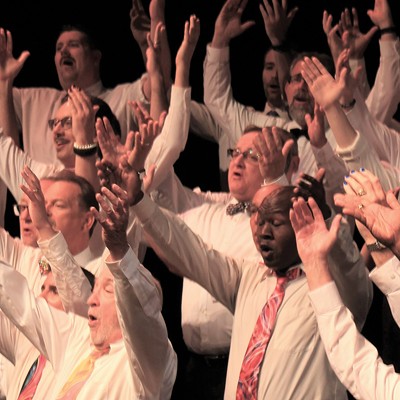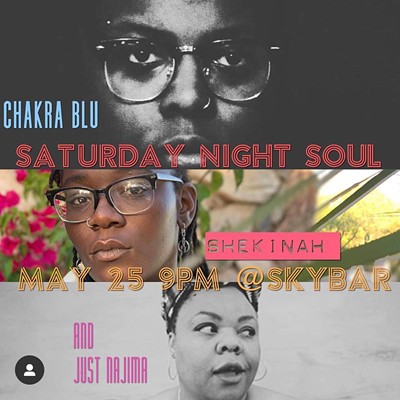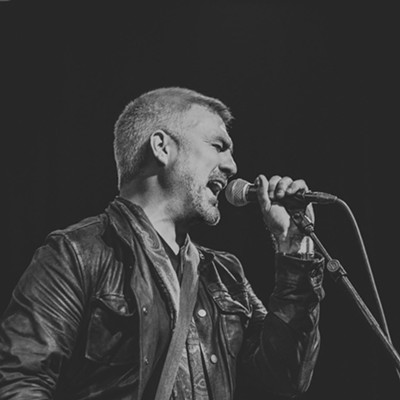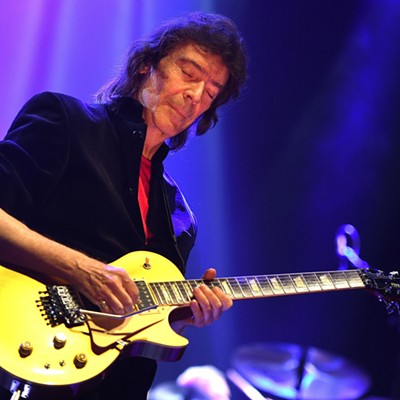Just like their rock 'n' roll forebears, the Modeens play music that's fearless in its diversity.
Though the band has been known for its garage/psychedelic sound since Cristina Williams and Jamie Laboz landed in Tucson four years ago from Los Angeles, their musical history covers rootsier material as well. When the seeds of the Modeens' third album, Electric Caribou, began germinating a couple of years back, those influences began showing up stronger.
"It was kind of hard at first," Laboz says about the band's decision to spread the styles around on Electric Caribou. "We had so many diverse songs that I was afraid it might not be a cohesive record, but then it just kind of fit together. It's like what we do live.
"We don't stick completely to one style. It's not just psychedelic garage or whatever. We're a rock band and we play a lot of different styles of stuff. The bands in the '60s would put out a record and there'd be a ballad and a fast song and a trippy song; there'd be a whole combination of different things and that's where we're at."
Electric Caribou is first and foremost a fun record, which will come as no surprise to anyone who's seen the band gigging around town. The first sound on the album is a beer can being opened, and the clink of bottles is heard in the background on "Modeens Theme," a perfectly grooving introduction to the record. Laboz's surf-guitar riffs intertwine with Dave Prival's high-wire keyboards and the jaunty bounce of Williams' bass, all on top of Jeff DiDay's driving beat.
"This album is more focused on being fun and not being too deadly serious," Williams says. "I love serious music, but there's enough serious stuff that goes on—and you need to pay attention to it and need to do whatever the appropriate response is to that—but you also need to still live and you need to still celebrate the good things and have fun. You need a release to forget about the harsh realities. We try to make sure everything is tight and rocking and the energy is good."
"Drinking is a Full Time Job" reflects that notion perfectly. A barroom boogie-blues tune featuring Prival on harmonica, the song was resurrected from Laboz's New York days playing in the Moonshine Messiahs, a band he calls "an early prototype" for the Modeens.
A New York native, Laboz cut his musical teeth playing in the punk tradition of the Clash and the Ramones. His mid-'90s band Frankenorange had signed to a division of Atlantic Records, but Laboz left when the label tried forcing changes on the band. Laboz and Williams met in New York, where she'd moved from Florida to pursue a singer-songwriter career. She transformed her style playing in rock bands and met Laboz, who played on and produced one of her solo records. Shortly after, they moved to Venice Beach, still working on solo projects.
"When a good friend moved from New York to join the band, we started calling it the Modeens, doing songs from each one of our projects," Laboz says.
The Electric Caribou title came from those L.A. days, when Laboz was playing in a dive-bar blues band and a burly hunter burst in with a huge platter of meat, shouting "You want some caribou?" The incongruous image stuck with Laboz and Williams, becoming first an inside joke, then with the addition of the word electric, a potential band name. Ultimately, it became the title for this latest mixed bag of an album.
"On the record, there's this mix of sort of rootsy tunes, organic stuff, and then there's really punkish tunes as well," Laboz says. "It's this combination of punk energy and some grounded acoustic kind of stuff."
Though the Electric Caribou title and some of its songs predate Laboz and Williams' move to Tucson, the album's sound is purely the result of the band's current lineup—stable, collaborative and cheerfully dedicated.
"It's decades of combined experience, coming together on a weekly basis for the last 21/2 years and just playing and enjoying each other's company," DiDay says.
Laboz and Williams landed in Tucson after visiting Michael P. Nordberg, whom they'd befriended in New York playing a Surly Wench show with his band in 2006. Another visit for the 2007 TapeOpCon sealed the deal.
"We got to see the local bands and see the musicians and see how into the whole music scene everybody was. It was refreshing. In L.A. it was a very different scene," Laboz says.
Laboz and Williams found a downtown place with high ceilings perfect for rehearsing and recording, and a neighbor, Kevin Henderson of the Swigs, ready to integrate the Modeens into the local scene.
"Kevin was like our Kramer. If I plugged in my guitar and started playing, he'd hop through the door and we would jam. He definitely got us going," Laboz says.
After trying out some other lineups, the Modeens found "the perfect stroke of luck," Laboz says, adding the dual-threat Prival and then DiDay after bumping into the drummer in a thrift store.
The now-evolved Modeens style is comfortable going outside the 1960s psych-influenced sound of the band's earlier records and a more accurate reflection of the musicians' past histories in music.
So Electric Caribou can't help but be a restless album. Prival's contributions bristle with energy. "Caroline" starts with a somber piano before shifting into a torrential garage-punk song, while "Not About Me" is gritty, raw and an even speedier track.
Williams takes the lead vocal on the jumpy retro-rocking "Fantasy" and on "Faster," a moodier Americana tune. "Favorite Shoes" is skewed country, with banjo and honky-tonk piano. Closing the album is "Free My Mind," another older Laboz track that's taken on new life as a slow-burning six-minute country-rock gem.
"It's like cooking because at the beginning, we all just throw our own ingredients into the pot from different recipes, and then after playing together for a few years, we have our own style of cooking and our own ingredients that are unique to the band," Laboz says. "Since we've been in Tucson, our music has definitely gone in a new direction. We did that whole garage-psychedelic kind of thing and now we're getting back to our roots that we brought to the table."









